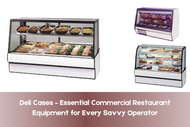Deli Cases – Essential Commercial Restaurant Equipment for Every Savvy Operator
Introduction
Deli cases are indispensable commercial restaurant equipment widely used in restaurants, delis, supermarkets, convenience stores, and catered food-service concepts. These refrigerated display units serve both functional and marketing roles by showcasing premium food products at safe temperatures. This article explains the features and operations of deli cases, highlights which establishments benefit most, and discusses when used restaurant equipment is a realistic option—especially for buyers in restaurant equipment Dallas.
1. What Is a Deli Case?
A deli case is a temperature-controlled display unit designed to hold cold food items—such as sliced meats, cheeses, salads, prepared meals, and desserts—while providing customers with easy, hygienic access.
Key styles include:
-
Open-front cases – Allows self-serve or staff-assisted access.
-
Glass-front (sealed) cases – Staff-served units with a cold-air seal.
-
Heated deli cases – Maintain warm foods like rotisserie chicken and hot sandwiches.
These units come in various sizes, from compact units for grab-and-go to full-length counters for commissary-style operations.
2. Core Features
2.1 Temperature Control
-
Standard range: 34°F to 40°F (1–4°C).
-
Heated units: up to 160°F (71°C).
2.2 Display and Lighting
-
Front glass for visibility.
-
LED lighting enhances presentation and reduces energy consumption.
2.3 Shelving Options
-
Removable and adjustable shelving to accommodate trays and containers.
-
Some units include tiered risers or bump rails for merchandising.
2.4 HVAC and Refrigeration
-
Built-in compressors or plug-and-play units with remote models.
-
Refrigeration systems often include auto-defrost features.
2.5 Hygiene and Cleaning
-
Stainless steel interiors with rounded corners.
-
Glass surfaces for easy sanitation.
-
Removable pans minimize cross-contamination.
2.6 Mobility
-
Casters for flexibility in layout and maintenance access.
3. Functions and Operational Benefits
3.1 Food Safety & Regulatory Compliance
Maintains consistent temperatures to prevent spoilage and bacterial growth.
3.2 Product Visibility & Upsell Potential
Attractive presentation increases impulse buys—especially in service-deli environments.
3.3 Efficiency & Staff Productivity
Allows rapid access for restocking or serving, reducing wait times and boosting labor efficiency.
3.4 Inventory Management
Improved visibility helps staff monitor product turnover and manage inventory better.
3.5 Brand & Ambience Enhancement
Modern deli cases elevate aesthetic appeal, reinforcing a brand’s professional image.
4. Who Needs a Deli Case?
4.1 Delicatessens & Butcher Shops
Essential for the display and sale of sliced meats, cheeses, charcuterie, and prepared salads.
4.2 Sandwich Shops & Quick-Service Restaurants
Display grab-and-go items like pre-made sandwiches, parfaits, drinks, and sides.
4.3 Grocery Stores & Supermarkets
Used for self-serve cuts like cheese and meats, plus ready-to-eat items.
4.4 Cafés & Bistros
Perfect for displaying cold meet-and-greet products such as pastries, sandwiches, or salads.
4.5 Convenience & Gas-Station Retail
Keeps chilled items organized and visible for quick customer grabs.
4.6 Buffet & Catering Businesses
Heated or cooled cases help maintain food quality and presentation during service.
5. New vs. Used Restaurant Equipment
5.1 Benefits of New Units
-
Full warranty and dealer support.
-
Latest refrigeration and lighting for energy efficiency.
-
Customizable configurations and sizes.
5.2 The Appeal of Used Restaurant Equipment
-
Lower cost—often 30–60% below new.
-
Good residual life from lightly used units.
-
Ideal for start-ups or budget-conscious operations.
Key considerations:
-
Inspect compressor, seals, and thermostat functionality.
-
Verify refrigeration system integrity and coolant levels.
-
Check for manufacturer recall, compliance and safety standards.
Dealers offering used restaurant equipment in restaurant equipment Dallas often recondition these cases with standard refurbishments and short warranties.
6. Buying Tips & ROI
6.1 Choosing the Right Model
-
Match planned menu and layout needs.
-
Choose style (open, staff-side, heated) based on service model.
-
Confirm capacity vs. expected sales volume.
-
Opt for energy-efficient lighting and refrigeration.
6.2 Price Benchmarking
-
New cases: $1,200–$5,000+ (depending on length, style, and features).
-
Used cases: $500–$2,500. Includes refurbished models.
6.3 Negotiation & Inspection
-
Request service history, leak and electronic checkups.
-
Ask for demonstration in operation.
-
Factor in delivery, install, and warranty into overall cost.
6.4 Maximizing ROI
-
Use case to upsell high-margin grab-and-go items.
-
Improve layout flow to boost throughput.
-
Energy-efficient models can lower utility expenses.
7. Maintenance Best Practices
-
Daily: Clean interior, sanitize trays, wipe glass.
-
Weekly: Remove shelving, scrub surfaces, inspect door gaskets.
-
Monthly: Clean condenser coils, ensure clearance for airflow.
-
Biannual/Annual: HVAC tune-up and optional refrigerant recharge.
Routine maintenance ensures optimal performance and fewer breakdowns.
8. Case Study
Dallas Deli Emporium invested $3,500 in a new 6-ft glass-front case. Within three months, they saw a 20% boost in prepared-meal grabs, accounting for a monthly profit increase of $1,200. ROI achieved in under 12 months, including reduced shrink from expired items.
9. Sustainability & Certification
Choose units with Energy Star, eco-friendly refrigerants (R290 or R134a), and LED lighting to lower operating costs and meet environmental standards.
Conclusion
Deli cases are foundational commercial restaurant equipment that combine food safety, visibility, and customer appeal—critical for delis, cafés, supermarkets, and grab-and-go operations. Businesses in restaurant equipment Dallas can benefit from both new and used restaurant equipment options, balancing budget with feature needs. With prudent selection and diligent maintenance, deli cases not only enhance presentation but also drive incremental sales and ROI.

